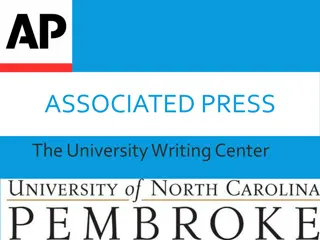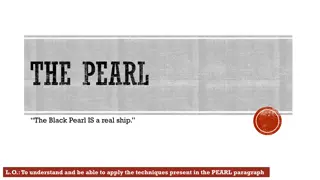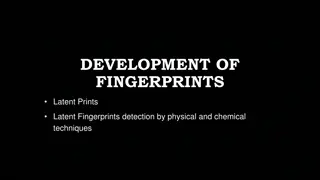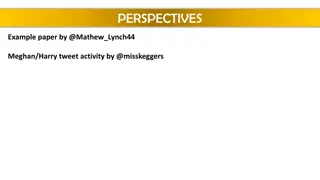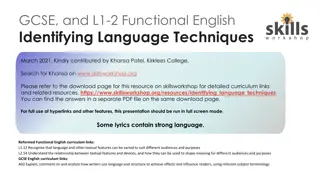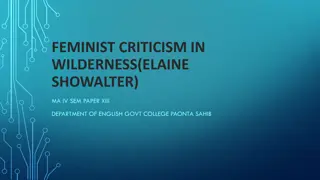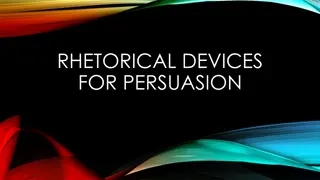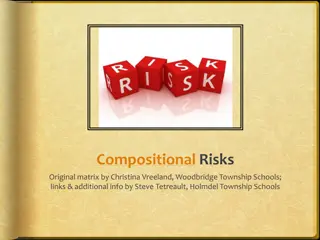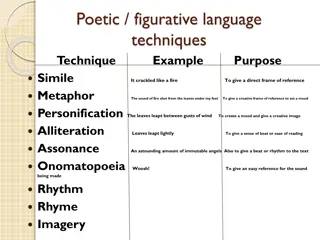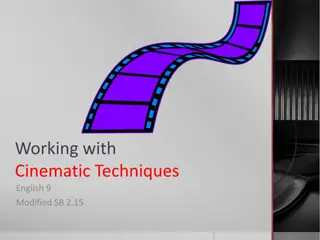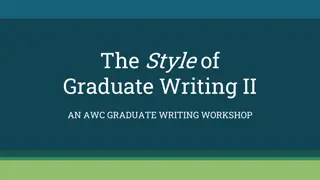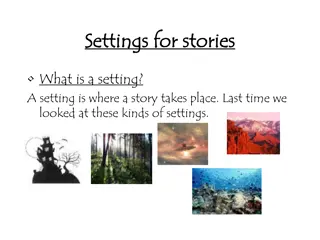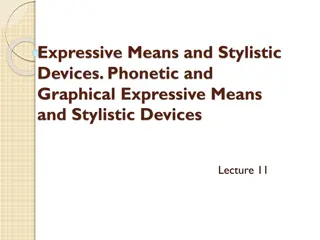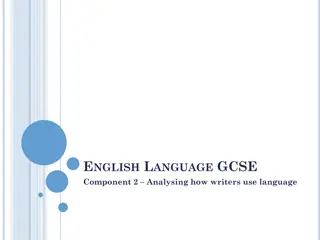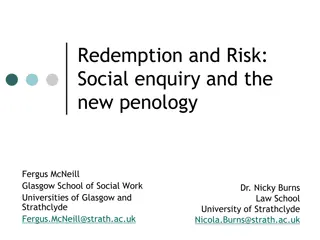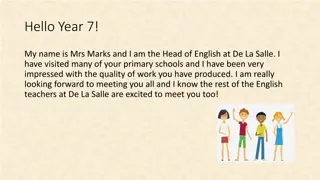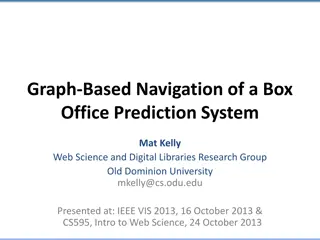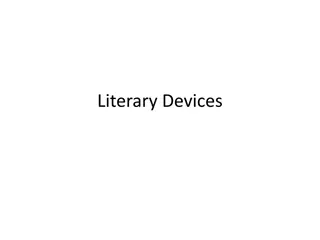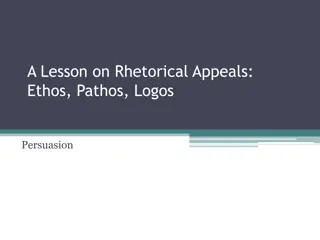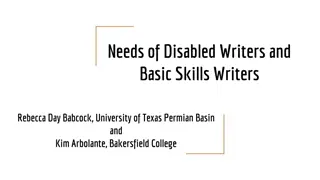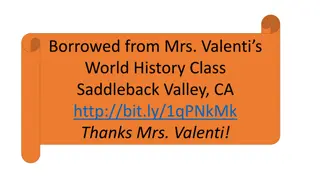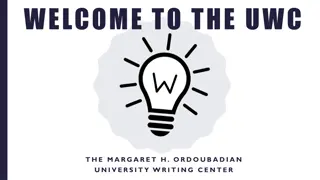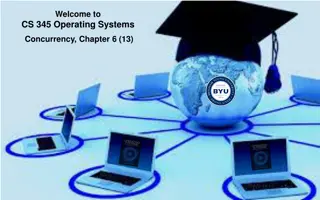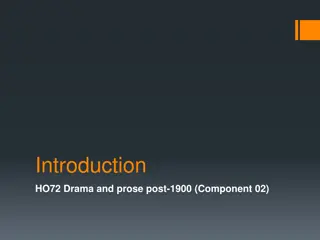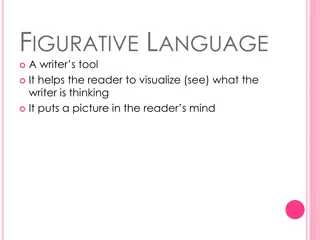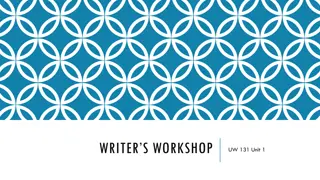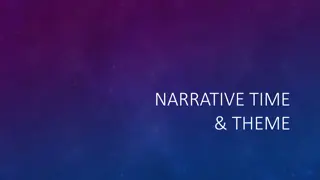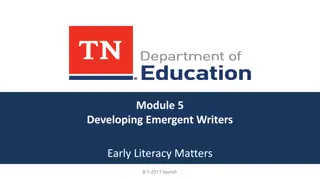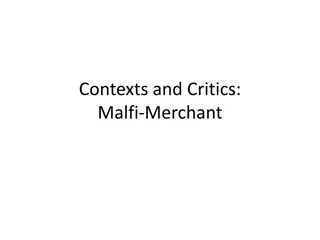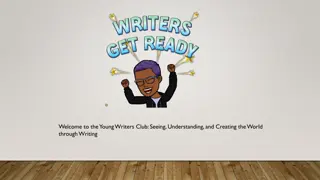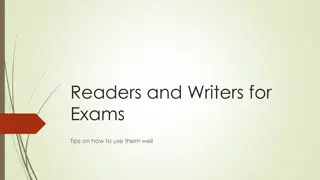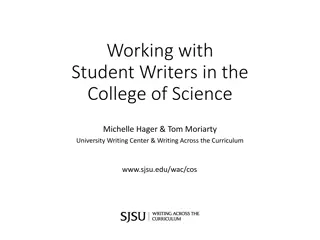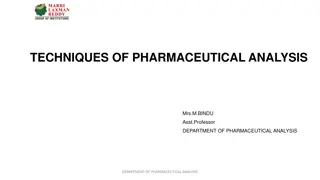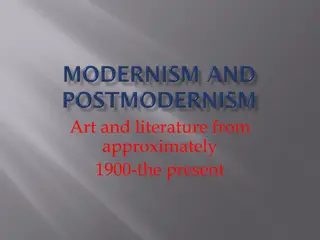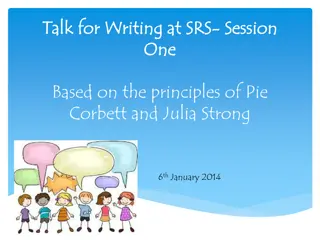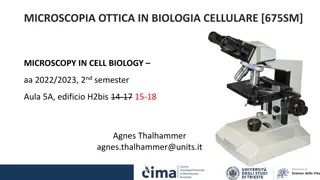Essential Guidelines for AP Style: Writing Tips and Techniques
Writing in AP style requires adherence to specific guidelines including consistency, clarity, accuracy, and brevity. This writing style follows the inverted pyramid format, focusing on conveying information in a concise and direct manner. The structure emphasizes getting straight to the point, with
4 views • 23 slides
Understanding the PEARL Writing Technique
The PEARL writing technique consists of the parts Point, Embedded Evidence, Analysis, Response, and Link. It is a framework designed to help students construct competitive paragraphs by including specific information desired by the curriculum. Each part plays a vital role in ensuring a well-structur
0 views • 10 slides
Understanding Fingerprint Development Techniques
Exploring the development of latent fingerprints through physical and chemical methods, conditions affecting latent prints, and various fingerprint development techniques like visual examination, powder techniques, and chemical techniques. Techniques such as alternate light sources and powder method
2 views • 22 slides
Analyzing Perspectives: Writers' Thoughts and Emotions
Delve into the perspectives of writers showcased in an example paper by Mathew Lynch and Meghan/Harry tweet activity by misskeggers. Explore questions on the writers' thoughts, feelings, imaginings, and experiences, and understand how they convey their perspectives through various methods and tones.
0 views • 20 slides
Identifying Language Techniques in English Literature
Explore language techniques used by writers, understand their definitions, and create sample sentences for each technique. Enhance your skills in recognizing language features through a variety of engaging exercises and examples. Dive into the world of literary analysis with this resource.
0 views • 27 slides
Feminist Criticism in the Wilderness by Elaine Showalter - Analysis
Elaine Showalter's essay "Feminist Criticism in the Wilderness" delves into the realm of feminist literary critique, addressing the diversity among women writers and emphasizing the importance of considering factors beyond gender. Showalter highlights the challenges and goals of feminist criticism w
0 views • 13 slides
Mastering Rhetorical Devices for Persuasion
Understand the art of rhetoric and the power of persuasion through ethos, pathos, and logos. Explore how writers use varying techniques like formal word choice, emotional appeal, and allusion to sway audiences. Delve into the persuasive appeals of ethos, pathos, and logos as explained by Greek philo
0 views • 12 slides
Exploring Writers' Viewpoints Through Music Texts
Dive into a lesson on evaluating writers' viewpoints and perspectives using music texts like Katy Perry's "Chained to the Rhythm." Understand the techniques writers use to convey their ideas and messages, and apply evaluation skills to analyze lyrics effectively.
0 views • 12 slides
Understanding Compositional Risks in Writing
Explore the concept of compositional risk in writing, where authors strive to create engaging and unique content. Learn about the risks writers take to captivate readers, from using voice, repetition, and figurative language to incorporating humor, sarcasm, and surprise elements. Discover how quirki
2 views • 24 slides
Exploring Language Techniques in Poetry
Delve into the art of poetic expression through various language techniques such as simile, metaphor, personification, and more. Uncover how writers utilize these tools to create vivid imagery, evoke emotions, and enhance the overall impact of their work.
0 views • 7 slides
Understanding Cinematic Techniques in Film Analysis
Dive into the realm of film analysis by exploring how directors use cinematic techniques to convey specific effects in their visual storytelling. Learn about shots, framing, camera angles, and movements, drawing parallels to how writers utilize point of view in literature. Discover the significance
1 views • 23 slides
Enhancing Coherence in Graduate Writing
Writing with coherence is essential for effective communication in graduate-level writing. Coherence, also known as flow, helps connect ideas logically within a sentence and paragraph. By structuring sentences to present old information before new information, writers can improve readability and cla
0 views • 39 slides
Crafting Compelling Stories: Tips and Techniques for Writers
Explore tips on creating captivating settings, developing realistic characters, starting a story effectively, using descriptive writing techniques, and enhancing your stories with literary devices like alliteration, rhyme, and similes. Enhance your storytelling skills with practical advice and examp
0 views • 10 slides
Understanding Expressive Means and Stylistic Devices in Language
Expressive means and stylistic devices play a vital role in intensifying language utterances, encompassing phonetic, morphological, lexical, word-building, phraseological, and syntactical forms. These tools help evoke emotions, logical emphasis, and additional meaning in communication. By utilizing
0 views • 13 slides
Analyzing Writer's Language Use in English Language GCSE Component 2
In English Language GCSE Component 2, students learn to analyze how writers use language. The learning objective focuses on commenting, explaining, and analyzing language use with relevant subject terminology. The exam assesses students on their ability to interpret and explain a writer's thoughts,
0 views • 12 slides
Redemption and Risk: Social Enquiry and the New Penology
Social enquiry explores transitions from old to new penology, emphasizing risk management over treatment and responsibilization over mitigation. Probation officers act as storytellers shaping perceptions in the criminal justice system, prompting humane responses and social explanations. Research del
2 views • 20 slides
Exploring Fiction Texts: Analyzing Story Openings
Delve into the art of analyzing fiction texts through the perspective of storytelling techniques, character narratives, and structural decisions made by writers to captivate readers. Understand the impact of narrative voice, tense usage, and sentence structures on creating engaging story introductio
0 views • 10 slides
Box Office Prediction System Using Graph-Based Navigation
A study conducted by Mat Kelly from Old Dominion University presents a graph-based navigation system for predicting box office ratings. The research used Visual Analytics techniques to analyze data sourced exclusively from movie IDs and listing files. By leveraging tools like D3.js, JavaScript, and
0 views • 20 slides
Exploring Literary Devices: A Comprehensive Guide
Delve into the world of literary devices with this comprehensive guide. From figurative language to alliteration, idioms to hyperbole, and more, learn how writers use these techniques to enhance their storytelling. Explore examples and visual representations to deepen your understanding of concepts
0 views • 11 slides
Understanding Rhetorical Appeals: Ethos, Pathos, Logos
Delve into the art of persuasive communication through the exploration of ethos, pathos, and logos appeals. Discover how these rhetorical tools are utilized to sway audiences' emotions, logic, and credibility. Gain insights on how to analyze and decipher persuasive techniques employed by writers, sp
0 views • 26 slides
Understanding the Needs of Disabled and Basic Skills Writers in Writing Centers
Explore the challenges and strategies related to disability, basic skills development, and access barriers faced by writers in educational institutions. Learn about evidence-based practices and developmental models to support diverse writers in improving their writing skills.
0 views • 13 slides
Italian Renaissance: Writers and Artists Spotlight
Italian writers like Dante Alighieri and Niccolo Machiavelli made significant literary contributions during the Renaissance period. Dante's iconic work, "The Divine Comedy," showcased societal issues, while Machiavelli's "The Prince" offered political advice emphasizing practicality over theory. Ita
0 views • 22 slides
UWC Margaret H. Ordoubadian University Writing Center Information
The UWC Margaret H. Ordoubadian University Writing Center provides a range of services to help writers at all stages of the writing process. Located in Walker Library, the center offers assistance with brainstorming, drafting, revising, and understanding assignments. Writers can bring various projec
0 views • 13 slides
Understanding Business Intelligence for Effective Business Analysis
Business Intelligence (BI) involves utilizing techniques and tools to convert raw data into valuable insights for strategic decision-making. By analyzing unstructured data, BI helps identify new opportunities and enhance business strategies for competitive advantage and long-term success. Components
0 views • 7 slides
Mastering Concurrency in Operating Systems: Tips and Strategies
Explore intricate concepts in operating systems concurrency from Chapter 6 of CS 345. Learn practical tips and techniques such as determining the size of arrays, managing readers and writers using semaphores, and tackling the Barbershop Problem. Dive into array manipulation, semaphore usage, and pri
0 views • 37 slides
Study of Modern Drama and Prose Post-1900
This component focuses on the study of a modern play (The History Boys) and a modern prose text (The Great Gatsby). Learners explore cultural and contextual influences on writers and readers, analyze literary texts, demonstrate understanding of contexts, and make connections across texts. The examin
0 views • 23 slides
Understanding Figurative Language in Writing
Figurative language is a powerful tool that writers use to enhance their work by creating vivid images in the reader's mind. This includes techniques such as similes, puns, oxymorons, allusions, foreshadowing, and paradoxes, each serving a unique purpose in conveying deeper meanings and engaging the
0 views • 27 slides
Mastering the Art of Writing Engaging Leads and Captivating Readers
Crafting a captivating lead is essential in journalism to entice readers into exploring a story further. This involves using techniques such as compelling photographs, intriguing headlines, and engaging first lines to hook readers from the start. By understanding the importance of strong beginnings
0 views • 36 slides
Comprehensive Overview of Writers Workshop Practices and Protocols
Explore the essential elements of Writers Workshop in educational settings, including course introductions, collaborative revision approaches, tuning protocols, and student feedback mechanisms. Learn about effective strategies, outcomes, and lessons learned to enhance the workshop experience for wri
0 views • 7 slides
Exploring Narrative Techniques for Representing Time in Writing
Explore the fundamental methods of narrating time in writing, including scene, summary, sequential summary, circumstantial summary, flashbacks, and non-linear narrative structures. Learn how writers transition between summary and scene, manipulate time, and craft engaging story arcs. Delve into exam
0 views • 9 slides
Developing Emergent Writers: Module 5 Overview
Module 5 focuses on developing emergent writing skills in children through activities that enhance fine motor skills, hand-eye coordination, and left-to-right directionality. Teachers play a crucial role in modeling purposeful writing and providing opportunities for children to experiment with writi
0 views • 11 slides
Influential Writers: Chaucer and Webster in English Literature
Chaucer, born in mid-14th century London, was influenced by French and Italian poets, creating impactful works like "The Canterbury Tales." On the other hand, Webster, born in 1580, crafted dark revenge tragedies like "The Duchess of Malfi," reflecting the troubled mood of his time. Both writers lef
0 views • 7 slides
Exploring the World of Young Writers Club: Writing, Creativity, and Perspective
Delve into the realm of writing with the Young Writers Club, where members immerse themselves in the art of expression, exploring diverse perspectives through words. From quick writes to creating poems using six words, participants engage in thought-provoking activities and gain insights into the po
0 views • 17 slides
Effective Strategies for Using Readers and Writers in Exams
Learn how readers and writers can assist you during exams by decoding text, reading instructions, and more. Discover what they can and cannot do, as well as useful phrases to communicate effectively with them. Explore the benefits of having a scribe for expressing thoughts quickly and effortlessly i
0 views • 10 slides
Understanding Fingerprint Development Techniques
Latent fingerprints are hidden impressions left by the friction ridges of the skin which require physical or chemical techniques for visualization. Factors affecting latent prints include surface type, touch manner, weather, humidity, perspiration, and suspect care. Techniques such as visual examina
0 views • 22 slides
Enhancing Student Writers' Skills in Science Disciplines
Student writers in the College of Science may struggle with transferring writing skills to new contexts. This article explores why writers forget and provides strategies for teachers to assist students in mastering unique writing genres within science disciplines.
0 views • 25 slides
Analytical Techniques in Pharmaceutical Analysis
Analytical techniques play a crucial role in determining the identification and concentration of chemical substances in pharmaceutical analysis. Techniques range from simple gravimetric analysis to sophisticated methods using specialized instrumentation. Various techniques like gravimetric, titrimet
0 views • 17 slides
Exploring Art and Literature from 1900 to the Present
Novels, plays, and poetry saw a resurgence post-Whitman and Dickinson, with writers experimenting with unique styles like interior monologue and stream of consciousness. Characters chased the American dream, expressing admiration for America as a land of opportunity. The Modernism movement reflected
0 views • 13 slides
Enhancing Writing Skills Through Talk for Writing Approach
Discover the key principles of Talk for Writing, understand the importance of Shared Writing, and explore how to improve the teaching and learning of writing in your classroom. Learn about the challenges children face in writing compared to reading and how Talk for Writing can help externalize the i
0 views • 27 slides
Microscopic Techniques in Cell Biology: Lessons and Labs Overview
Explore the fascinating world of optical microscopy in cellular biology, covering topics such as image formation, contrasting techniques, fluorescence microscopy, live-imaging techniques, and quantitative microscopy. Dive into the principles behind various microscopy techniques and experimental labs
0 views • 7 slides
